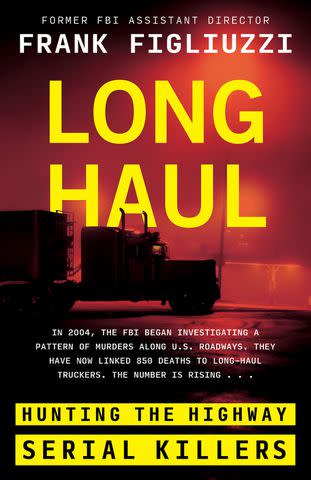'They Hide in Plain Sight': Book By Ex-FBI Official Examines 'Killer Truckers' Who Have Murdered Hundreds
A new book by former FBI official Frank Figliuzzi examines the hundreds of sex trafficking victims who have been murdered by long-haul truckers.

Getty
America’s highways contain a dark secret. Over the past four decades, hundreds of dead bodies have been discovered strewn alongside the roads that link different parts of the country.
The bodies are mostly slain women, many of whom were victims of sex trafficking, and the startling reality has gotten the FBI’s attention. They have since linked 850 killings to a specific group: long-haul truckers. Around 200 of these killings remain unsolved.
A new book by former FBI Assistant Director for Counterintelligence Frank Figliuzzi digs into these killings and explores why this phenomenon occurs. The book, Long Haul: Hunting the Highway Serial Killers, was released on May 28.
“This book is a deep dive into some of the places on our nation's highways, but it's also a book about these three subcultures that exist right under our nose,” Figliuzzi tells PEOPLE. “They hide in plain sight, the sex trafficking, the killer truckers. They exist even alongside us as we're driving on the highway.”

Courtesy of Meckler
Frank FigliuzziTo get a sense for the long-haul lifestyle, Figliuzzi, who is now retired from the FBI, decided to get some firsthand experience.
Along with a flatbed trucker identified in the book as “Mike,” Figliuzzi rode in a big rig for over 2,000 miles, for days on end. What he learned was that the trucking lifestyle is extraordinarily challenging, with drivers sedentary for large periods of time, making it extremely difficult to maintain a healthy lifestyle.
“What the experts have told me is, 'Look, it's an isolated, almost hermit existence for most truckers,’” he says.
But why are there high rates of killings? There’s not a simple answer to that question, but through his research, Figliuzzi has found that the lifestyle can be a contributing factor.
“You've got the perfect storm, people realizing, that lone lifestyle out there, ‘Man, I am between police jurisdictions, I essentially can do whatever the hell I want and no one's going to catch up with me,’” Figliuzzi says. “That's a reality, and it's a balance of people saying that before they get into trucking and people realizing it as they're into their trucking career.”
The FBI launched the Highway Serial Killings Initiative in 2009, five years after an Oklahoma Bureau of Investigation analyst noticed a trend of dead bodies being dumped along the Interstate 40 corridor across four states. The initiative’s database subsequently mapped the locations of where hundreds of bodies were found. The red dots were scattered across the entire United States.
The FBI has documented data on these murdered women going back to at least the 1980s, Figliuzzi says. And in many cases, it takes months or sometimes years to find and identify the women, who are often found in wooded areas, culverts or drain pipes near remote stretches of highway.

Mariner Books
Long Haul: Hunting the Highway Serial KillersBecause many of the victims are also victims of sex-trafficking, not all are reported missing, with many having previously been disconnected from their families.
“The trauma of your daughter, your sister overdosing for the third time, fights at family dinners, bailing her out of jail after she's been arrested for theft or prostitution, putting up with her pimp. People start to distance themselves. They don't want to know. They can't know anymore," Figliuzzi says.
There are exceptions, however. One of the high-profile cases covered in Long Haul is that of Robert Ben Rhoades, better known as the “Truck Stop Killer.” Rhoades is currently serving a life sentence for convictions on two counts of murder, and has been linked with other cases.
One of Rhoades’ victims was 14-year-old Regina Walters, whom he kidnapped while she hitchhiked along a road in Texas. He subsequently raped and brutalized her, eventually killing her in an abandoned barn.
The case is an example of how killer truckers take advantage of passing through different jurisdictions, making it harder to find their victims and harder for law enforcement to investigate.
The book also delves into the infamous “Redhead Murders,” which remain unsolved and are believed to have been committed by a trucker. Also featured is the case of “Vampire Trucker” Timothy Vafeades, who kept six women in his truck as sex slaves, though he has never been linked to any murders.
Related: 'Vampire Trucker' Who Kept Women as Sex Slaves in His Semi-Trailer Gets 20 Years
During the process of researching the book, Figliuzzi also spoke to women who have survived harrowing encounters with truckers, some of whom were sexually assaulted. The book is dedicated in part to those survivors.
“My hope is that people will come to a greater understanding of the trap of trafficking in our society,” Figliuzzi says of one of the aims of his book. “No one really champions the cause or speaks for these deceased victims because their lives have been snuffed out.”
As a former law enforcement official, Figliuzzi has ideas to improve practices when it comes to both investigating these murders and helping those affected.
He stresses that it is crucial for local agencies to submit their data on unsolved cases that involve bodies found near highways, in order to paint a better picture of how many murders there actually are.
Want to keep up with the latest crime coverage? Sign up for PEOPLE's free True Crime newsletter for breaking crime news, ongoing trial coverage and details of intriguing unsolved cases.
And just as important, the former assistant director for counterintelligence wants law enforcement agents to stop treating survivors of trafficking as criminals, and instead offer help and support.
The book is also dedicated to the truckers of America, who Figliuzzi says are by and large good, hard-working people, and part of the backbone of the economy.
“We've got to get better at honoring our truckers through better pay, better training, cross-training, and vetting who comes into the trucker industry,” he says.
Having now spent time on the road and living like a trucker for a few days, Figliuzzi has a better understanding of the valuable work done by long-haulers.
“The good news is that I came away incredibly impressed with modern trucking and truckers,” he says. “They work really hard to feed their families by putting food on our tables for our families. And the driver that I was riding with, a young guy in his mid-to-late-twenties, if he is the future of trucking, then we are in good shape. He was bright, energetic, and willing to share and to learn as well, and passionate about his work.”
If you or someone you know has been sexually assaulted, please contact the National Sexual Assault Hotline at 1-800-656-HOPE (4673) or go to rainn.org.
For more People news, make sure to sign up for our newsletter!
Read the original article on People.


